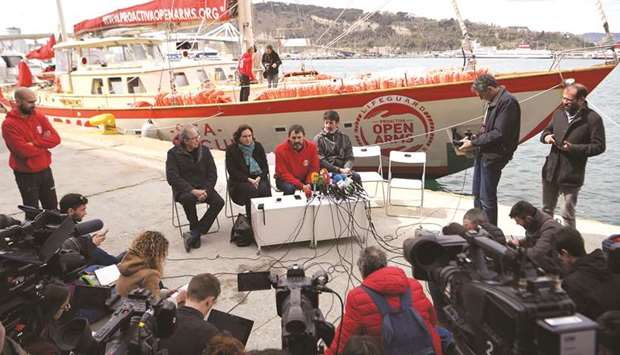A Spanish migrant rescue charity has seen its ship confiscated by an Italian prosecutor after the organisation disobeyed orders to hand over migrants to Libyan authorities.
The ship, run by the Proactiva Open Arms non-governmental organisation (NGO), docked at the Sicilian port of Pozzallo on Saturday, with 216 people on board.
Catania prosecutor Carmelo Zuccaro ordered its seizure and placed its captain and two other NGO officials under investigation, the Ansa news agency and other Italian media reported late on Sunday.
“They are accusing us of criminal association and abetting illegal migration for refusing to hand over women and children to Libyans,” the NGO’s founder, Oscar Camps, wrote overnight on Twitter.
In a press conference yesterday in Barcelona, Camps claimed that the Italian authorities’ ultimate motive was to eliminate migrant rescue NGOs from the Mediterranean.
Zuccaro did not reply to a request for comment, but according to multiple media reports, his investigation focuses on a Thursday incident between Proactiva Open Arms and the Libyan coastguard.
The NGO said it was threatened with guns by the Libyans, but refused to hand over women and children it said it had rescued in international waters.
However, a European Commission spokeswoman, Natasha Bertaud, said yesterday that “the Libyan coastguard was operating within its territorial waters” when it intercepted the Spanish ship.
On Facebook, the Libyan navy accused the NGO of acting recklessly, racing to rescue the migrants before the Libyans, and ignoring orders, although the Libyans were supposed to co-ordinate the operations.
Tensions continued on Friday, as Proactiva accused the Italian coastguard of stalling in giving it permission to dock at an Italian port.
The NGO was eventually allowed to land in Sicily, but the Italian coastguard said they should have asked Spanish authorities for advice on where to go, and noted that Malta was the closest port for them.
Before the Spanish vessel arrived in Pozzallo, a critically ill three-month-old baby and his mother were put on a Maltese coastguard speed boat and taken to Malta for urgent treatment.
Speaking in Brussels before meeting EU counterparts, Spanish Foreign Minister Alfonso Dastis said he wanted to “clarify what [Proactiva] are accused of and the justification for these accusations”.
In a similar case, German migrant rescue NGO Jugend Rettet had its ship impounded by prosecutors in Trapani, Italy, in August, on suspicion of abetting illegal immigration.
Jugend Rettet is still fighting to have the boat back, and Italy’s top appeals body, the Court of Cassation, is due to rule on the case on April 23.
On Twitter, Camps said that Zuccaro’s office was only investigating “a crime hypothesis”.
He called the ship’s impounding by the authorities a “precautionary” measure.
A judge has yet to validate the seizure order, Ansa said.
Camps protested that “preventing the rescue of lives at risk in the open sea in order to forcibly return them to an unsafe country – such as Libya” is in breach of international law.
Most migrants who embark on dangerous sea journeys to Europe are desperate not to return to Libya, where they face widespread abuse and torture.
Zuccaro has a history of launching accusations against migrant rescue NGOs: last year, he said he suspected them of acting in cahoots with Libyan people smugglers, possibly taking money from them.
His remarks prompted a parliamentary investigation that found no proof of the allegations, but led the Rome government to draft NGOs a code of conduct for migrant rescue charities.
The code, signed by Proactiva, commits NGOs to “not enter Libyan territorial waters, except in situations of grave and imminent danger
[...] and not obstruct search and rescue by the Libyan coastguard”.
With EU support, Italy has given equipment and training to the Libyan coastguard, boosting their capacity to intercept migrants before they are picked up by NGO vessels.
Such policies were enacted against a backdrop of rising anti-migrant sentiment in Italy, where more than 600,000 arrivals from North Africa and beyond have been recorded since 2013.
Matteo Salvini, whose far-right League party made large gains in March 4 elections, congratulated Zuccaro on Twitter: “Finally an Italian prosecutor is blocking the trafficking of human beings!”

The founder of the Spanish NGO Proactiva Open Arms, Oscar Camps (second right) gives a press conference yesterday with Spanish singer Joan Manuel Serrat (left), Barcelona Mayor Ada Colau, and Spanish former basketball player Jordi Villacampa at Barcelona’s harbour.
